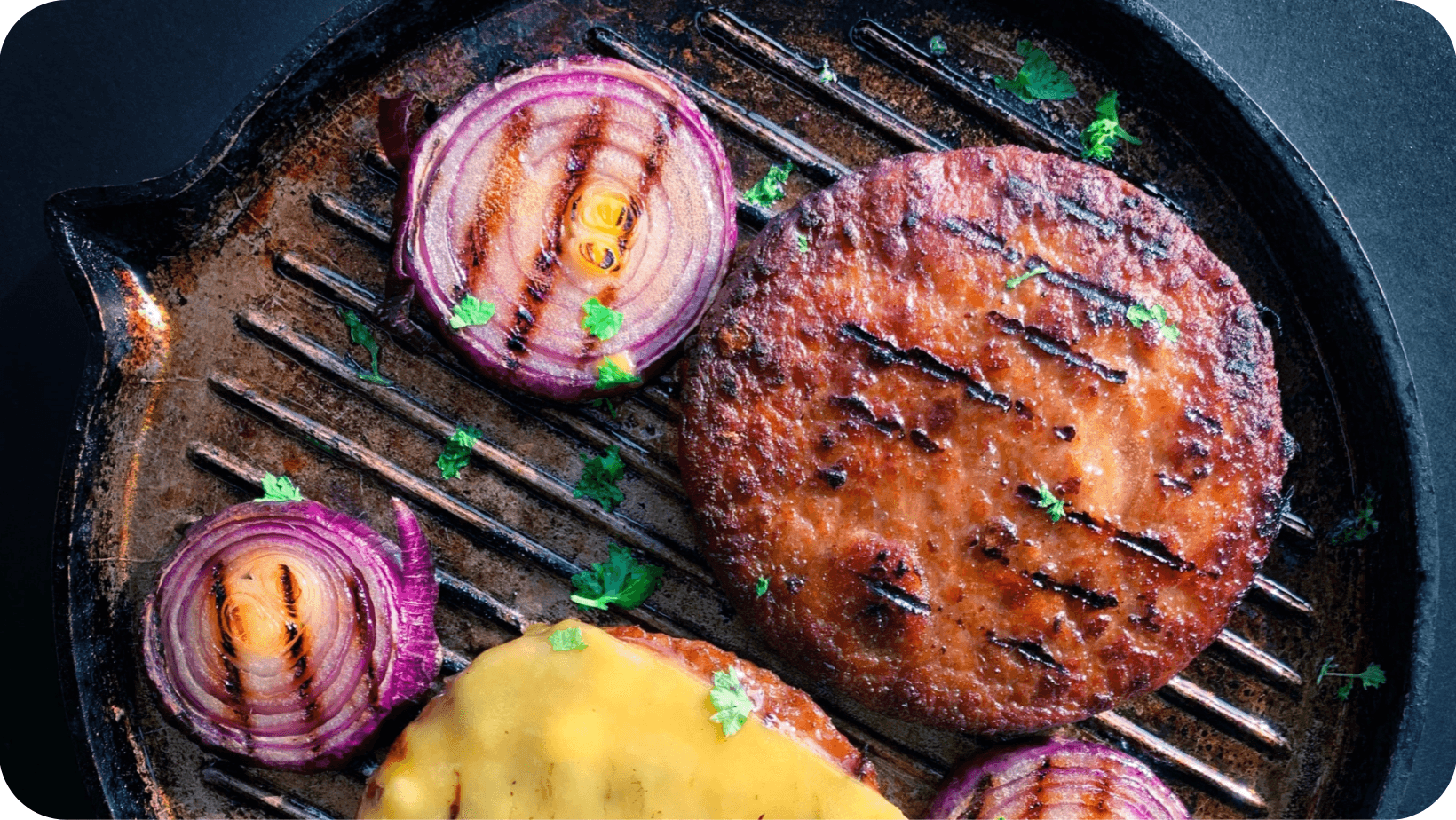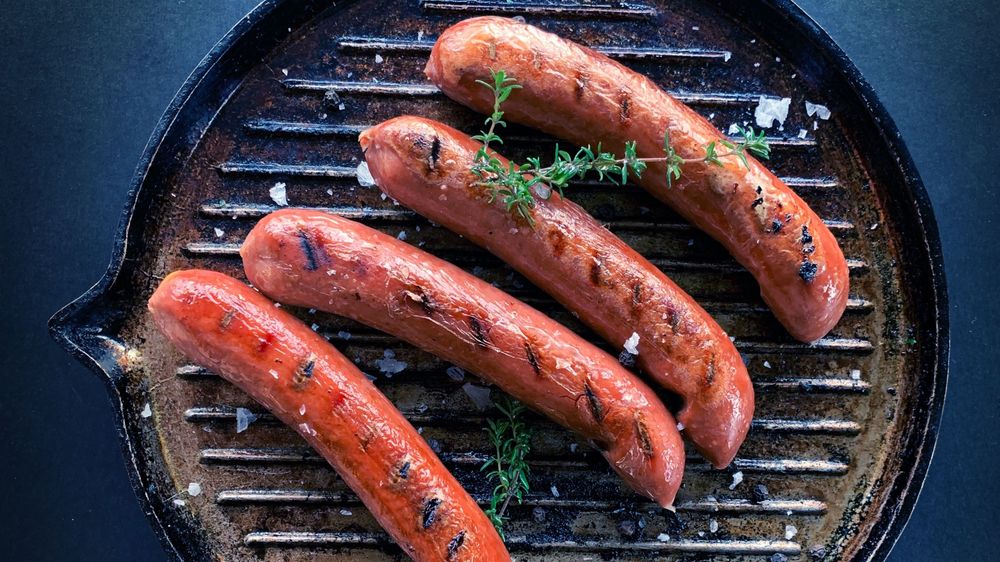Healthy or unhealthy? Meat-free alternatives explained
It’s 2022, and the veggie and vegan market is becoming increasingly saturated with meat-free alternatives to some of our favourite meals. Gone are the days of Linda McCartney sausages being our only option (although we absolutely rate these, thanks Linda), now we can step into a supermarket and find vegan chicken, steak, bacon, duck, you name it - even vegan salmon.
But do you ever stop to think - what are meat-free alternatives actually made from? Are they healthy? Or are they overly processed, even leaning towards unhealthy? We won’t lie, these are questions we’ve asked ourselves too, and we wanted to share our findings with you.
In summary, most meat-free alternatives are likely to be made from one of the following; tofu, tempeh, seitan, vegetable protein, pea protein or mycoprotein.
Let’s break these down:
Tofu
Tofu (also referred to as bean curd) has been around for centuries and originated in China. Made from condensed soy milk, it is pressed into solid white blocks, similar to the process of making cheese. Soy is a ‘complete protein’ containing all nine essential amino acids: they are essential as they can’t be made by the body and need to be obtained from food. Soy is often linked to having a negative effect on hormones, as it contains phytoestrogens (the plant form of oestrogen), however many studies show the opposite to be true. We would recommend choosing organic tofu wherever possible, to avoid soybean crops that have been exposed to GMO. In all its glory, tofu is a great addition to meals such as stir fry’s - it’s packed full of minerals such as calcium, magnesium and iron, is a great source of protein source and unsaturated fat.
Tempeh
Tempeh is also made from soybeans, though in this process they are fermented and compacted into a firm block, retaining the whole bean as part of the process. Some varieties also contain brown rice as part of the recipe, giving it an overall chewy texture and nutty taste. Tempeh has a higher content of protein, fibre and vitamins than tofu, and also contains healthy bacteria and probiotics due to its fermentation process. Many people use tempeh as an addition to sandwiches, burgers or salads.
Seitan
Seitan, or wheat gluten, is a great meat-alternative as it can be very similar in texture to actual meat; dense and chewy with a savoury flavour, it is often used as a substitute for chicken. Made from a mixture of wheat flour and water, the dough is then rinsed to remove the starch and leaves a mass of gluten protein, resulting in a low-carb product. It is also a highly nutritious food packed with protein and minerals, whilst being naturally low in fat.
Textured vegetable/soy protein
Textured vegetable protein is made from the byproducts of extracting oil from soybeans. Soy protein retains a lot of its minerals such as zinc, calcium, iron and fibre, as well as being high in protein. However, being more highly processed than the soybeans it is produced from, some argue it is not the healthiest option.
Pea protein
Pea protein is becoming one of the leading supplements due to the fact that, like soy it contains all nine essential amino acids, making it a ‘complete’ protein. It is derived from yellow and green split peas by forming a powder and mixing with water to remove the fibre and starch. The product is then left with mostly protein and some vitamins. This product can be found in many popular meat-free brands, such as Meatless Farm, Squeaky Bean and the infamous Beyond Meat Burger.
Mycoprotein
Mycoprotein, or also known as fungus protein, is made from fermenting ingredients such as fungi spores, glucose and other nutrients in a similar process to creating beer. Mycoprotein is manufactured most commonly under the brand Quorn, renowned for creating a range of vegetarian and vegan alternatives. Sometimes egg or milk can be added to products to enhance the texture, therefore making it not always vegan, always be sure to check the label first. It is high in protein and fibre and rich in essential amino acids.
Jackfruit
Jackfruit is often used as a substitute for pulled pork in recipes due to its chewy, flakey texture, and works amazingly in BBQ recipes. It is an unprocessed, natural tropical fruit and sounds like the healthiest option, however Jackfruit is actually much higher in carbs and low in protein.

In summary, many meat-free alternatives offer a great range of essential nutrients and high protein, whilst in comparison to meat, they are much lower in cholesterol, fat and carbs. But most importantly, it has a lower impact on our planet and helps us live in harmony with the wonderful animals on our planet, rather than on our plate.
Whilst meat-free alternatives are widely available and thoroughly enjoyable, it is still advisable to eat a varied diet inclusive of a wide range of whole plant-based foods for optimum health. There are plenty of ways to get our protein and nutrient intake from vegetables, fruits, pulses and legumes, so mix it up! Try adding coronation chickpeas to a salad, spiced beans to a curry, courgette and peas thick with pesto to a pasta or risotto dish, or add a Mediterranean vegetable traybake to complement your fries instead of regularly opting for processed meat-alternatives.
By incorporating more natural protein sources into our diets several times a week, we can maintain a healthy vegan diet and enjoy the meat-free alternat
ives a heck of a lot more when they’re seen as a treat to divulge and enjoy.
A great app that we found helps when it comes to maintaining a healthy vegan diet is Dr Greger’s Daily Dozen app, it’s free to download and is a daily guide of how much from each food group to eat daily for optimum health. Simply tick as you go and it resets each day, a great tool for healthy eating and we do love a free app! Dr Greger’s How Not To Die and How Not To Diet cookbooks are well worth checking out too, with some amazing recipes to try at home.
As the vegan market continues to thrive and grow one thing we can be certain of, is that the days of limited food options are well and truly over, there isn’t a single cuisine that can’t be veganised in some way and whether you opt for store-bought, or to make yourself at home, we can be sure that we are helping nurture the planet and our bodies along the way.
